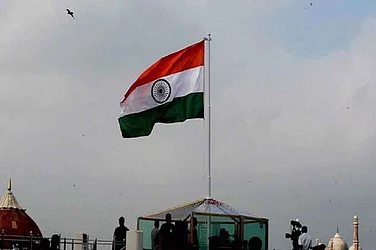‘Ret Samadhi’ is a story of an 80-year-old woman who slips into depression after the death of her husband, but transcends boundaries—geographic, emotional, and social—to travel to Pakistan, where she lived before, to revisit and resolve the painful trauma of partition – a journey that is as personal as it is political. Using powerful Hindi words, the author Geetanjali Shree writes on a myriad of themes pertaining to religions, genders, languages, ages, life and death. When the book was released in India, the sales were modest, as the author herself accepts in multiple interviews. Months later, it became the first ever Hindi-language novel, written by Geetanjali Shree and translated by Daisy Rockwell, to win the International Booker Prize in 2022.
In a country where one comes across different languages by driving across states, translation has opened new doors of access to stories of almost every aspect of life – from arts and crafts, to beliefs and customs, to society and politics. Shree and Rockwell’s win brought back the much-needed attention on how the diversity of the Indian literary landscape contributes to this greater access amid popularity of English-language writing, especially in the West.
The win also helps inspire bilingual writers to write in a language other than English. Like Geetanjali Shree says in multiple interviews, she actively chooses to write in Hindi, which is her mother tongue. She says this while almost speaking flawless English. As she grew up in various Hindi-speaking towns of Uttar Pradesh, she always felt “a tug towards Hindi literature” despite having the privilege of formal English education. This award will inspire all those who still feel that connection with their mother tongue, she had said.
Over the past few years, several literary awards have shortlisted and lauded works of translation. The coveted JCB Prize for Literature in 2022, was perhaps the first time that an Indian award, not specifically designated for translated work, shortlisted only translations from various Indian languages into English. Especially in the last five years, works in translation have increasingly been featured on their shortlists, with Khalid Jawed's The Paradise Of Food, translated from Urdu by Baran Farooqi, winning it in 2022 and M Mukundan’s Delhi: A Soliloquy (Eka), translated from Malayalam by Fathima EV and Nandakumar K, winning it in 2021. For the 2023 awards, the JCB announced its longlist of ten books in September. This year, there are four translations – from Bengali, Hindi, and Tamil – and six books originally written in English.
In an interview to the Indian Express, American Hindi and Urdu language translator and artist Daisy Rockwell perfectly describes the art of translation. She says the relationship between a writer and translator is almost like a dance. The two hold each other in an embrace, pirouetting and picking up cues from one another’s body language to put together a performance designed to enthrall. It fosters partnerships that look out for each other, even when the audience is looking away, or watching out only for the one leading the dance.
The fact that the English version of Shree’s novel – “Tomb of Sand” translated by Rockwell sold 30,000 copies in Britain and 50,000 copies in India, stands as a testament to the power of translation across borders.
The politics of translation
Like most systems in a country, hierarchies play an important role in the practice of translation. Over the years, the act of translating has witnessed debates around cultural appropriation and identity politics.
For example, when the English translation of Polish Nobel laureate Olga Tokarczuk’s novel 2007 Flights won The Man Booker International Prize in 2018, translator Jennifer Croft's name was missing from the cover of the book, despite her long engagement with the project.
Two years later, in September 2021, Croft announced on Twitter that she would not translate any more books without her name on the cover. “I’m not translating any more books without my name on the cover. Not only is it disrespectful to me, but it is also a disservice to the reader, who should know who chose the words they’re going to read,” she tweeted. Croft’s statement shed light on the continuing rally by translators for acknowledgment of their work by naming them on book covers.
Further, there is a growing concern that the pre-exisiting language dynamics could lead to unintended consequences – such as if works translated into English are given more prominence than their original versions, potentially limiting the influence of native authors and publishers.
Having said that, translation acts as a means of inclusion. The International Translation Day celebrates this very act and recognises the invaluable contributions of translators and interpreters in bridging linguistic and cultural divides.


























